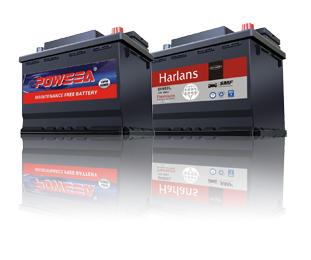ISO 14001:2015 et les batteries de voiture - Ce que cela signifie pour vous et pour l'environnement
Pourquoi se soucier de la norme ISO 14001:2015 lors de l'achat d'une batterie de voiture ?
Si vous êtes à la recherche d'une batterie de voiture, vous vous concentrez peut-être sur les performances, la longévité ou le prix. Mais avez-vous déjà réfléchi à son impact sur l'environnement ? C'est là qu'intervient la norme ISO 14001:2015. Il s'agit d'une norme internationalement reconnue pour les systèmes de management environnemental (SME), qui garantit que les fabricants minimisent leur empreinte écologique. Chez Powsea, nous prenons cela au sérieux, en produisant des batteries de démarrage au plomb-acide 12V de haute qualité, sans entretien, qui répondent à des normes environnementales strictes.
Pourquoi cela est-il important pour vous ? Une batterie de voiture certifiée ISO 14001:2015 n'est pas seulement bonne pour la planète : elle signifie également que le fabricant suit des processus de production responsables, réduisant les déchets dangereux et garantissant des méthodes de recyclage appropriées. Cela contribue à protéger l'environnement tout en vous garantissant une batterie fiable et sûre.
Qu'est-ce que la norme ISO 14001:2015 ? Une explication simple
ISO 14001:2015 est une norme mondialement reconnue qui définit le cadre dans lequel les entreprises doivent gérer leur impact sur l'environnement. Il s'agit d'un règlement écologique qui garantit qu'une entreprise réduit la pollution, améliore l'efficacité énergétique et traite correctement les déchets.
Pour les batterie automobile l'industrie, cela signifie :
-
Utiliser des procédés de fabrication plus propres
-
Réduction des émissions nocives lors de la production
-
Veiller au recyclage et à l'élimination appropriés des piles usagées
-
Respecter les normes environnementales légales et réglementaires
Idées reçues sur la norme ISO 14001:2015
-
"Il s'agit simplement d'une certification - rien ne change dans le produit.
Beaucoup pensent que la norme ISO 14001:2015 n'est qu'un simple label, mais elle oblige en fait les fabricants à améliorer en permanence leurs performances environnementales. Lorsqu'une entreprise respecte ces normes, cela signifie qu'elle réduit activement la pollution et les déchets. -
"Cela ne profite qu'à l'environnement, pas à l'acheteur.
En réalité, une batterie provenant d'une usine certifiée ISO 14001:2015 a plus de chances d'être plus sûre et de durer plus longtemps. Une production efficace réduit les défauts et améliore la qualité globale. -
"Les batteries au plomb sont mauvaises pour l'environnement quoi qu'il arrive.
Alors que les batteries plomb-acide traditionnelles contiennent des métaux lourds, la norme ISO 14001:2015 garantit des processus de recyclage appropriés. Les batteries plomb-acide sont en fait l'un des produits les plus recyclés au monde, avec plus de 99% de plomb réutilisé.
Pourquoi choisir une batterie de voiture certifiée ISO 14001:2015 ?
-
Meilleur pour l'environnement - Le fabricant réduit activement les déchets et les émissions.
-
Des normes de qualité plus élevées - Une entreprise axée sur le développement durable est également susceptible de fabriquer des produits plus fiables.
-
Recyclage responsable - L'élimination et le recyclage appropriés réduisent les dommages causés à l'environnement.
-
Respect des règlements - Veiller à ce que le produit respecte les normes environnementales mondiales, en évitant les risques juridiques.
-
Soutien à la fabrication durable - Encourage l'industrie à adopter des méthodes de production plus écologiques.
Chez Powsea, nous donnons la priorité à la responsabilité environnementale tout en fournissant des batteries plomb-acide de haute performance. Notre processus de production conforme à la norme ISO 14001:2015 vous garantit une batterie de voiture fiable et écologique sans compromis sur la qualité.
FAQ
1. La norme ISO 14001:2015 signifie-t-elle qu'une batterie de voiture est totalement écologique ?
La pile 100% n'est pas écologique, mais la norme ISO 14001:2015 garantit que sa production et sa mise au rebut respectent des directives environnementales strictes, ce qui réduit considérablement son impact.
2. Comment savoir si un fabricant de batteries de voiture est certifié ISO 14001:2015 ?
Consultez le site web du fabricant ou la documentation du produit. Les fournisseurs réputés comme Powsea affichent fièrement leurs certifications.
3. Les batteries au plomb sont-elles toutes mauvaises pour l'environnement ?
Pas nécessairement. Bien qu'elles contiennent du plomb, presque toutes les batteries plomb-acide sont recyclables, et les fabricants qui respectent la norme ISO 14001:2015 garantissent une manipulation et une réutilisation correctes.
4. Une batterie certifiée ISO 14001:2015 dure-t-elle plus longtemps ?
Bien que la certification en elle-même ne garantisse pas une plus longue durée de vie de la batterie, elle signifie que le fabricant suit des processus de contrôle de la qualité qui peuvent se traduire par de meilleures performances.
5. Une batterie certifiée ISO 14001:2015 est-elle plus chère ?
Pas toujours. De nombreux fabricants certifiés optimisent leur production, réduisant les déchets et les coûts, ce qui peut rendre leurs produits compétitifs.





